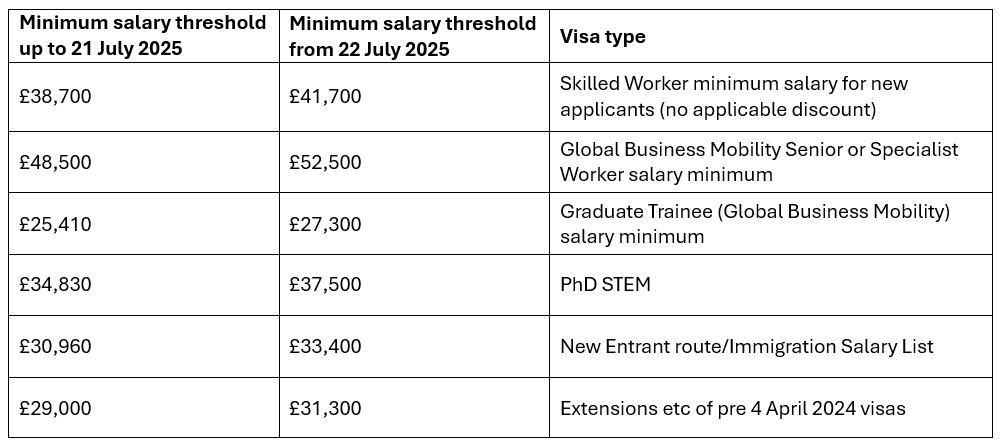New Immigration Rules published (HC 997) to take effect 22 July 2025

Key Points
- Sponsors can still assign a COS against an eligible RQF level 3 role on or before 21 July 2025 (and file the visa application post 22 July).
- The skill level will increase for Skilled Workers back to Graduate level (RQF level 6).
- Salaries will increase for multiple routes, reducing the list of sponsored jobs.
- The overseas social care worker route will end for new entry clearance (overseas) applicants on 22 July 2025.
- Current Immigration Salary List for shortage occupations will initially be expanded, then phased out.
- Further Rule changes not covered here, expected end of the year.
Overview
As set out in a previous update, the Government’s Immigration White Paper, announced 12 May 2025, proposed extreme changes to the UK immigration system.
On 1 July 2025, the Statement of Changes to the Immigration Rules (HC 997) was published confirming which of the changes set out in the White Paper will take effect from 22 July 2025. It is the start of a “complete reset” of the UK Immigration System.
Most changes concern sponsored work visas and the end of overseas recruitment of care workers. We report on those changes below.
Main proposals
Skilled Worker Visa – changes from 22 July 2025
From 22 July 2025, the following changes are being made to Skilled Worker visas:
- Level of qualification – The minimum skill level for new qualifying sponsored Skilled Worker jobs will again increase from RQF level 3 (A-level equivalent) to a bachelor’s degree or equivalent RQF Level 6 qualification (the level it was previously under the old Tier 2 General system before the 1 December 2020 Immigration Rule changes). This change effectively removes, depending on where you read, between 111 and 180 occupations from the Skilled Worker visa route. Employers take note – whatever the number, there will be many roles which will no longer qualify for sponsorship under the Skilled Worker Route from 22 July 2025! To be clear, applicants from overseas or those applying to switch into this route from other routes will have to follow the new Rules. Those who are currently employed in these occupations under the Skilled Worker route can continue to be sponsored. Skilled workers already in the UK will be exempt from the increased skill level requirement (for now).
- Salary thresholds are being increased across multiple work routes from 22 July 2025. Key increases are set out in the table below, based on a 37.5 hour work week. However, expect these salary thresholds to be kept under review. The new minimum hourly rate is increasing from £15.88 to £17.13. As in previous years, transitional arrangements will apply, and you can sponsor a worker under the current lower minimum salary thresholds, provided a Certificate of Sponsorship (CoS) is assigned by 21 July 2025 to the worker. Therefore, those granted on the basis of a CoS issued on or before 22 July 2025 can continue to renew, change employment and take supplementary employment, in occupations below RQF level 6. To avoid a state of panic closer to the deadline date, assign the CoS sooner rather than later. Do NOT wait until 21 July 2025 to assign it, in case the Home Office closes the SMS for updates a few days beforehand and you can’t assign the CoS by the deadline.
Key increases in Salary levels include:

To reflect these salary changes, Appendix Skilled Occupations has been restructured, so that it now presents the eligible occupations and updated increased going rates in separate tables for occupations at RQF level 6+ (Tables 1, 2 and 3) and occupations at RQF levels 3-5 (Tables 1a, 2aa and 3a).
To be clear, the 'going rates' for the SOC 2020 occupation codes have increased, and you will need to pay whichever is the higher of the general salary threshold or the going rate for the relevant Occupation Code. For example, the general salary threshold is £38,700 but the going rate for Marketing, Sales and Advertising Directors (OC1132) will, pre 22 July, need a salary of £83,000 under Table 1 Tradeable Points A (based on a 37.5 hour work week). From 22 July, the general salary threshold will be increasing to £41,700 but the higher going rate for Occupation Code 1132 is £87,300.
Recruitment of overseas social care workers - change from 22 July 2025
This route will end on 22 July 2025. This effectively means that no new overseas applications will be accepted; however, there are transitional provisions to allow in-country switching for care workers already in the UK (including extensions and change of employment applicants) until 22 July 2028. To apply under these provisions, workers must have been legally employed by their sponsor for at least three months prior to their application.
New Temporary shortage occupation list
The current Immigration Salary List for shortage occupations will be expanded initially to include RQF level 3-5 roles that have been identified as shortage occupation roles. It will then be phased out by the end of 2026.
Separately, a new interim Temporary Shortage list will be introduced to allow time-limited immigration access for roles which (a) do not require a degree; and (b) are “critical” to the UK's industrial strategy or key infrastructure projects. It will run alongside the existing Immigration Salary List, which remains in place for roles identified by the MAC in recent reviews. Unlike the Immigration Salary List, there is no discount to the salary requirements, or lower visa application fee, for a job being included on the Temporary Shortage List. There are more than 60 occupation codes for jobs that are below graduate level on this interim Temporary Shortage list. However, any workers who are able to use the temporary shortage occupation list will not be able to bring dependants to the UK. Additionally, salary threshold and visa fee discounts will be removed. Furthermore, these occupations will be removed by the end of 2026 (with the exception of adult social care where there are specific separate arrangements), which will create a position of uncertainty for those performing these shortage roles, after the Rules change, which raises the question of how attractive this concession will be in practice.
As a side note, the use of the temporary shortage list is to be reviewed by the Migration Advisory Council (MAC) and any future list will be based on their recommendations.
Additional notable changes
Part 9 of the Immigration Rules requires a sponsor to cease to employ a worker, and their leave may be curtailed, if they take a period of unpaid leave for four weeks or more in total whether over a single period or more than one period during any calendar year, unless this is for a permissible absence as follows: (1) statutory paternity leave, (2) statutory parental leave, (3) statutory shared parental leave, (4) statutory adoption leave, (5) sick leave, (6) assisting in a national or international humanitarian or environmental crisis (provided the sponsor agrees to the absence for that purpose), (7) taking part in legally organised industrial action, (8) jury service or (9) attending court as a witness.
The Statement of Changes now adds neonatal care to the list of permitted reasons.
What about the other key White Paper proposals not included in HC 997?
The White Paper introduced a few other key changes, which are NOT set out in HC 997 and expected to come into force at some point at the end of the year (2025/2026) following a consultation process:
- English language requirement enhancements, from Level B1 to B2 of the CEFR for main Skilled Worker applicants, indicating an "independent user" who can communicate fluently and confidently in most situations. A language requirement will also be introduced for Dependant Partners, for the first time, at a lower level, A1 or “basic user”.
- The route to Settlement as a Skilled Worker to double, from five to ten years, though individuals who make “greater contributions” may apply sooner. The White Paper does not expand on the meaning of “greater contributions” or explain whether this change will be applicable to those who already hold permission in the Skilled Worker category. These issues are likely to be covered in the promised consultation at the end of the year.
- Reducing the standard length of the Graduate visa (for international students to say on and work in the UK) from 2 years to 18 months.
- Immigration Skills Charge to increase by 32%, rising to £480.48 per year for businesses that benefit from the small company exemptions in the UK Companies Act 2006 and £1,320 per year for those that do not.
- Roll out of targeted industry Workforce Strategies by creating a Labour Market Evidence Group (LME Group), comprising skills groups and government agencies, to inform on the state of the domestic labour market and the role that different policies can play. So, for example, sponsorship of visas in some sectors may be conditional on the employer meeting certain skills and training requirements.
We will of course prepare a further update as soon as any further developments are announced.
Summary
The main thrust of the original White Paper and the proposed Immigration Rule changes set out in the latest Statement of Changes (HC 997) is that UK employers must have plans (and resources) in place to ensure that, if the migration route is not open to their overseas/global recruitment and workforce requirements, they have domestic staff who are skilled, trained and able to fulfil the roles. A noble aim, yes, and one which has been embedded for many years in immigration policy. However, the complexity of global recruitment strategies, recruiting talent and market/economic conditions, means that this is not always possible. Skills and training are also tied to the education system more generally and ensuring those entering the UK job market have the necessary skills and aptitudes for the workplace.
The impact of these radical changes is an opportunity to review recruitment strategies, perhaps, but careful future recruitment and talent planning are going to be vital, especially if the LME Group‘s recommendations could impact the sponsorship of workers in your business. Above is a summary of the main changes.
How can Doyle Clayton help?
If your workforce will not be eligible for a sponsored visa following the Immigration Rule changes, contact us immediately and we will do our best to try to expedite the application under the current Immigration Rules to meet the 22 July 2025 deadline.
We can still help after 22 July! The transitional provisions that are being introduced will create significant legal complexity for individuals and sponsors alike, who will be required to navigate through a plethora of salary options and SoC tables to assess whether an Occupation Code and salary meet the minimum sponsorship requirements of Appendix Skilled Worker. It will be vital to obtain legal advice and support to help you understand what these changes mean for you and your business.
For further information and advice or to discuss specific changes announced please contact Anita de Atouguia (pronounced ‘da-at-two-gear’), Head of Immigration or your usual contact in our dedicated Immigration team.
Contact Us
Contact our immigration team online or call +44 (0)20 7329 9090
Anita de Atouguia
Anita has specialised in immigration law since 2000 and is one of the UK's leading immigration experts. She joined Doyle Clayton in 2012 to set up its Immigration service having worked in the immigration practices of some of the UK’s best known full service law firms including CMS and Lewis Silkin.
- Partner & Head of Immigration
- T: +44 (0)20 7778 7233
- Email me
The articles published on this website, current at the date of publication, are for reference purposes only. They do not constitute legal advice and should not be relied upon as such. Specific legal advice about your own circumstances should always be sought separately before taking any action.

